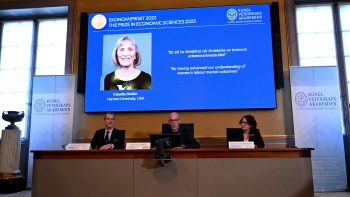Economists win Nobel for "search theory"
TEXT OF STORY
Kai Ryssdal: We have been talking for, what, two and a half years now about the labor market. About how lousy it is. About how hard it is to create new jobs. Generally, as if that labor market were a single coherent thing. The three men who won the Nobel Prize in Economics this morning beg to differ. Americans Peter Diamond from MIT, Dale Mortensen of Northwestern and Christopher Pissarides of the London School of Economics. Their official citation reads “for their analysis of markets with search frictions.” In simpler terms, they explained why it is that we can have lots of unemployed workers and unfilled jobs. Or plenty of people looking to buy a house and so many unsold homes on the market all at the very same time.
Marketplace’s Mitchell Hartman explains.
Mitchell Hartman: In a perfect economy, price would be determined by a simple equation of supply and demand. How many flat-screen TVs are for sale, how many people want them. Not enough buyers, price goes down. Not enough TVs, price goes up.
Jim Poterba: The starting point model that economists often talk about for supply and demand doesn’t really say much about how buyers and sellers come together.
MIT Economist Jim Poterba says what today’s Nobel winners have described in complicated equations is the “friction” that gets between actual buyers and sellers, or employers and job-seekers. It’s all the added costs and complications of searching.
Poterba: The notion that there is search, that search takes time, that people wait for the best offer they might be able to get, is a very important reality in many markets: Housing markets, cars or other things you might sell in auctions or on eBay, and in particular in the labor market.
And here’s the problem with the job market that this “search theory” can help solve: How can there be so many people unemployed, and yet still be so many employers advertising job openings they can’t fill?
Economist Mark Kuperberg at Swarthmore College says, imagine if the labor market were a produce market instead.
Mark Kuperberg: You don’t see a lot of rotting tomatoes and rotting fish in produce markets, and yet you do see a lot of unemployed workers, especially now. The question is why? Why is it that the labor market does not seem to work as well in terms of allocating workers to jobs?
The models developed by today’s Nobel winners explain the factors that get in the way of a market that efficiently matches workers and jobs. Factors like whether workers have the right job skills; and people’s difficulty selling a house right now and moving; and unemployment benefits that are sometimes higher than the low-wage jobs that are available.
I’m Mitchell Hartman for Marketplace.
There’s a lot happening in the world. Through it all, Marketplace is here for you.
You rely on Marketplace to break down the world’s events and tell you how it affects you in a fact-based, approachable way. We rely on your financial support to keep making that possible.
Your donation today powers the independent journalism that you rely on. For just $5/month, you can help sustain Marketplace so we can keep reporting on the things that matter to you.


















